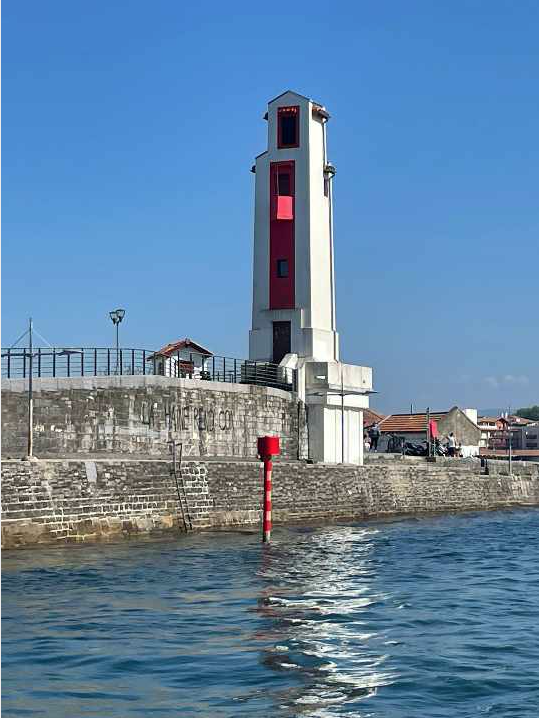
Ciboure
The origins of Ciboure
A former whaling and cod fishing port, a former district of Urrugne, Ciboure is now world famous for having given birth to the famous composer Maurice Ravel, whose birthplace is on the quay on the edge of Nivelle.
The history of Ciboure is also closely linked to that of its neighbour, the town of Saint-Jean-de-Luz. Indeed, if a first center of settlement is attested in the 12th century in this fragile haven, it is really with the development of the activity of the port and fishing that the urbanization of the bay intensifies. In 1611, the link between Luziens and Cibouriens wanted to be strengthened by the creation of a convent of the Récollets order, located on the peninsula in the middle of the port. At the same time, the bay is filled with architectural elements linked to maritime activity such as lighthouses, alignment lights and the excavation of the port of Socoa. In 1660, the marriage of Louis XIV of France to the Infanta of Spain, Marie-Thérèse, took place in Saint-Jean-de-Luz, marking a historic turning point for the two cities. This prestigious event attracted European nobility and aristocracy, thus contributing to the cultural and architectural development of the region.
If the fishing economy has hitherto shaped the appearance of the towns of Saint-Jean-de-Luz and Ciboure, seaside tourism will in turn profoundly modify the urban landscape with the appearance of villas and gardens on the hills. (Bordagain, Socoa and Aice Errota), but also the creation of leisure facilities specific to this activity. Mallet Stevens, Pavlovsky, William Marcel, Hiriart, Godbarge or even the Gomez brothers, make the bay a veritable laboratory of architecture that is now inseparable from the identity of the territory.
Finally, we cannot mention the Country of art and history of Saint-Jean-de-Luz & Ciboure without highlighting the richness and diversity of its intangible heritage such as the Basque language, music, singing, the festivals and the gastronomy which are lived on a daily basis, between tradition and modernity.
The essentials of Ciboure
Ciboure is like a rare pearl nestled on the Basque coast which combines authentic charm, rich history and an exceptional natural setting.
You can discover the charming port of Ciboure there. With its colorful boats moored along the quays, it offers a picturesque sight and a lively atmosphere. You can stroll along the quays and soak up the maritime atmosphere and admire the panoramic view of the ocean and its neighbor Saint-Jean-de-Luz.
The Saint-Vincent church, located in the heart of the historic district of Ciboure, is an architectural gem not to be missed. This 13th century church has a Gothic façade and sumptuous interior decoration. When you enter inside, you will be amazed by its colorful stained glass windows and its atmosphere imbued with spirituality. It is also famous for having been the wedding place of the French composer Maurice Ravel.
Ciboure has an exceptional historical heritage with in particular the Fort of Socoa, the Maison Ravel, the Cloister and the Chapelle des Récollets.
Renowned for the quality of its gastronomy, you will find all the seafood products there, in particular its famous Ttorro, but also all the traditional recipes of Basque cuisine.
The Basque Country is always linked to the Festival, you will find in Ciboure, a rich and varied animation: pelota, Basque force, Basque and Spanish dance, songs, classical concerts of the Ravel Academy, the Estudiantina and its group of mandolins … Ciboure is also a superb hundred-year-old 18-hole golf course very popular with locals!
Ciboure also offers a preserved natural setting, conducive to outdoor activities. Take advantage of the fine sandy beaches, such as Socoa Beach, to relax in the sun or indulge in water sports such as sailing, paddleboarding or surfing. Hiking enthusiasts will appreciate the coastal paths offering panoramic views of the ocean and the rugged cliffs.
Living in Ciboure
Ciboure offers an exceptional quality of life. Living in Ciboure means enjoying an enchanting setting combining unspoiled nature, ancestral traditions and authenticity of the Basque Country.Ciboure offers a variety of local shops and the traditional market is held every Sunday, from 8 a.m. to 1 p.m., on Place Camille Jullian.
Ciboure benefits from a privileged geographical location, close to renowned towns in the Basque Country. You can easily get to Saint-Jean-de-Luz, famous for its history and its magnificent beach, or to Biarritz, renowned for its surf spots and lively cultural life. These neighboring destinations offer a multitude of activities and possibilities to enhance your daily life.
Living in Ciboure means embracing an incomparable living environment. You will be surrounded by picturesque landscapes, between the Atlantic Ocean and the majestic Basque mountains. Nature lovers can enjoy mountain hikes, beach walks or boat trips to explore the beautiful Basque coast.
Ciboure offers a variety of properties, ranging from traditional Basque houses to sumptuous contemporary villas. Indeed, there are many houses of character, with their distinctive architecture and authentic charm. For people looking for absolute prestige, Ciboure also offers high-end properties offering breathtaking ocean or mountain views with lush gardens and quality appointments.
In summary, living in Ciboure will allow you to enjoy the best of Basque life, in an idyllic setting where every day is an invitation to relaxation, discovery and fulfilment.